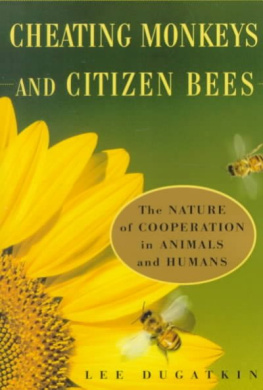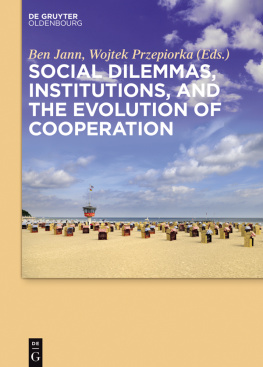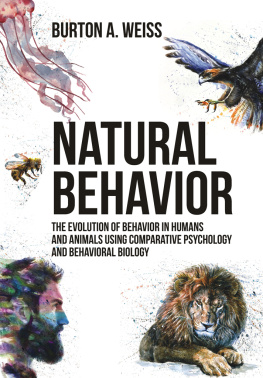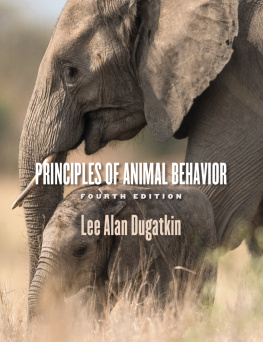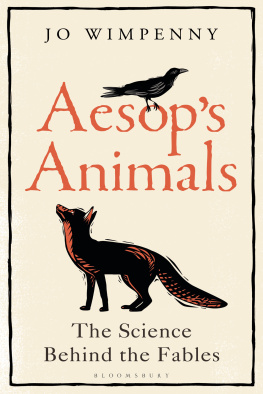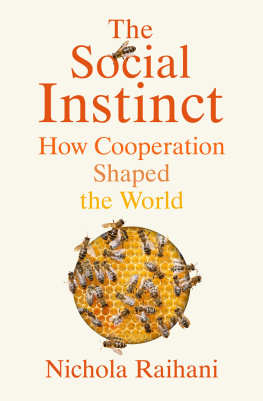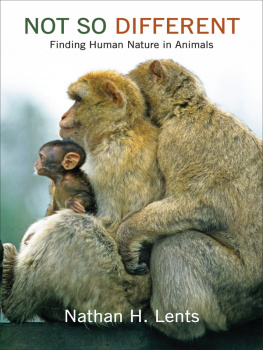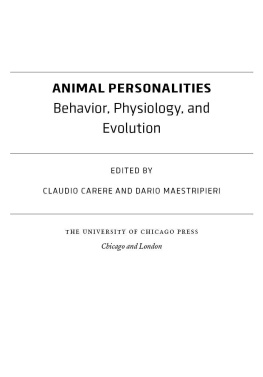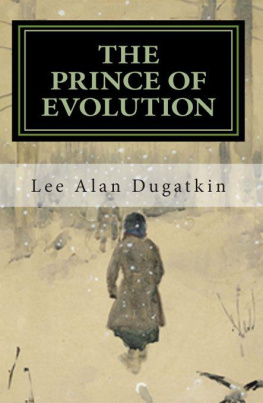


THE FREE PRESS
A Division of Simon & Schuster Inc.
1230 Avenue of the Americas
New York, NY 10020
www.SimonandSchuster.com
Copyright 1999 by Lee Dugatkin
All rights reserved, including the right of reproduction in whole or in part in any form.
THE FREE PRESS and colophon are trademarks of Simon & Schuster Inc.
Designed by Pei Koay
Manufactured in the United States of America
10 9 8 7 6 5 4 3 2 1
Library of Congress Cataloging-in-Publication Data
Dugatkin, Lee Alan, 1962
Cheating monkeys and citizen bees: the nature of cooperation in animals and humans / Lee Dugatkin.
p. cm.
Includes bibliographical references and index.
1.Social behavior in animals. 2. Animal behaviorEvolution. 3. Cooperativeness (Psychology). I. Title.
QL775.D84 1999
591.56dc21 98-27768
CIP
ISBN 0-684-84341-2 (hc)
ISBN-13: 978-0-684-84341-4
eISBN-13: 978-1-439-13651-5
To my father, Harry, on his eightieth birthday. Mazel Tov.
Contents
Preface
For the first five years that I studied the evolution of behavior, I was what I now refer to as a for the love of science scientist. That is, I was absolutely fascinated with evolutionary biology, and it was my love for the subject that drove me to do what I did. I was not concerned about what direct, practical impact my work would have on people; I was simply convinced that it was inherently interesting. In fact, it went further than that. During this stage of my intellectual development, I actually held those scientists who directed their work toward helping people in contempt. I viewed them as intellectual prostitutes, who sold their souls and were driven by the mundane, everyday wants and needs of the masses rather than by the sheer beauty and excitement that made up the heart of science. I am ashamed that I ever held such a view, but I did.
I began studying the evolution of cooperation in animals about twelve years ago. I found the topic fascinating, and despite its clear implications for humans, I was unconcerned about what my work would tell us about how to make people more cooperative. If pressed, I would justify my work to friends and family by showing them how one could use what I do to understand human behavior, but that was not what drove me to do my work, it was merely a happenstance. I would have been just as happy studying some area of evolution that did not so easily lend itself to human analogies. Furthermore, the ideas I did have on how my work on animal cooperation might apply to human cooperation were at best fuzzy and undeveloped.
After operating in the for the love of science mode for about five years, I met my future wife, Dana, and soon our wonderful little boy, Aaron, was on the scene. In addition to the huge changes they brought about in my everyday life, Dana and Aaron had a profound effect on how I thought about science. Perhaps cooperation became more critical in my personal life. For whatever reason, I became more and more convinced that my work had relevance to those who were scientists by training. When I looked in Aarons trusting eyes, I realized it was only a matter of time before he asked me what science was. I decided that the best way for me to answer him would be to describe the beauties of scientific investigation and also to identify how it can have human consequence. As a start, I intend one day to share with him my thoughts on how ideas emerging from the study of animal cooperation might facilitate human sociality. This book is for him.
I am greatly indebted to my editor at the Free Press, Stephen Morrow. Stephen had the unenviable task of taking on this book halfway through the editorial process, but he quickly began providing critical advice that had a significant impact on the final product. Susan Arellano worked with me on the early stages of the manuscript (including encouraging me to write the book in the first place), and her input helped set the tone for what followed.
I have talked about the evolution of cooperation with hundreds of colleagues over the last ten years, and while I cant name them all, I am obliged to mention three. My mentors Jerry Brown and David Sloan Wilson taught me almost everything I know, and I can never repay them for what they have given me in the way of both advice and friendship. Michael Mesterton-Gibbons was absolutely integral in helping me to develop mathematical models of the evolution of cooperation, and I look forward to our future work in this area.
Without the love, encouragement, and help of my wife, Dana, this book would never have come to fruition. In addition to proofreading every chapter more times than I (or she) care to recall, Dana also was pivotal in helping shape the ideas in this book. She is an amazing lady. My parents, Harry and Marilyn, and my brother David have encouraged me through the years. They read through this book and provided me with much needed advice. Lastly, I thank my little boy, Aaron, for helping me keep things in perspective.
Cheating Monkeys and Citizen Bees
INTRODUCTION
The Four Paths to Cooperation
It is true that certain living creatures, as bees and ants, live sociably one with another [and] some men may desire to know why mankind cannot do the same. To which I answer:
First, that men are continually in competition for honor and dignity, which these creatures are not; and consequently amongst men there ariseth on that ground, envy and hatred, and finally war.
Secondly, that amongst these creatures, the common good differeth not from the private. But man, whose every joy consisteth in comparing himself with other men, can relish nothing but what is eminent.
Thirdly, that these creatures, having not, as man, the use of reason, do not see, nor think they see any fault, in the administration of their common business; whereas amongst men, there are very many, that thinks themselves wiser, or abler to govern the public, better than the rest; and these strive to reform and innovate and thereby bring into distraction and civil war.
Fourthly, that these creatures, though they have some use of voice, in making knownst to each other their desires, and other affections; yet they want that art of words, by which some men can represent to others that which is good, in the likeness of evil; and the evil in the likeness of good.
Fifthly, irrational creatures cannot distinguish between injury and damage; and therefore as long as they be at ease, they are not offended with their fellows; whereas man is then most troublesome, when he is most at ease; for then it is that he loves to control the actions of them that governth the commonwealth.
Lastly, the agreement of these creatures is natural; that of men is by covenant only, which is artificial; and therefore it is no wonder if there be somewhat else required.
Writings of a biologist? A psychologist? No, instead these words come from Leviathan, the work of seventeenth-century philosopher and political scientist Thomas Hobbes. Was Hobbes right about animal and human cooperation? What, in fact, is the nature of cooperation?
Scientists who study human behavior argue about many thingsin fact, they argue about everything from the minutiae of everyday life to grander questions regarding good and evil, the motivations underlying our actions, and whether we are driven primarily by genes, culture, or some intricate interaction of the two. One thing they do not disagree about, however, is whether humans are social creatures. We are, period. We know of no cases throughout history where large numbers of humans have intentionally lived outside the fabric of
Next page
